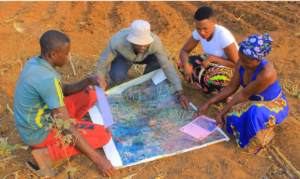Key Accomplishments and Challenges
 During this first quarter of fiscal year (FY) 2021, ILRG increased the pace of activities following six months of general slowdown due to the coronavirus disease 2019 (COVID-19) pandemic. While COVID-19 impacts in the United States and Europe meant that all staff based there were working from home, teams in project countries were able in some cases to start working out of the office and engaging with beneficiaries, albeit with increased vigilance, particularly related to limiting travel and ensuring the use of facemasks, distancing measures, limiting participant numbers and handwashing for all meetings. USAID mission staff were also increasingly able to interact both with the project and government staff under differing conditions in each country.
During this first quarter of fiscal year (FY) 2021, ILRG increased the pace of activities following six months of general slowdown due to the coronavirus disease 2019 (COVID-19) pandemic. While COVID-19 impacts in the United States and Europe meant that all staff based there were working from home, teams in project countries were able in some cases to start working out of the office and engaging with beneficiaries, albeit with increased vigilance, particularly related to limiting travel and ensuring the use of facemasks, distancing measures, limiting participant numbers and handwashing for all meetings. USAID mission staff were also increasingly able to interact both with the project and government staff under differing conditions in each country.
Mozambique: ILRG launched subcontracts and training of implementation partners for field activities with Novo Madal, Portucel, and Green Resources in this quarter. These partners subsequently carried out gender assessments and initial registration of individuals in participating communities, particularly around women who will be engaged in economic empowerment activities. National coordination with the USAID Supporting the Policy Environment for Economic Development (SPEED+) program continued on policy and law. ILRG distributed 100 tablets to the Ministry of Land and Environment to carry out a national level survey on land tenure security to inform the policy process. Advancement of activities in Sofala continued with the hiring of a coordinator and agreements with local government partners.
Zambia: lLRG’s land rights documentation engagements with three partners neared completion with the validation of records across four chiefdoms. Partners’ focus will begin to move towards administration and long-term capacity building. Within the wildlife and natural resource management sectors, ILRG community partners increased the quality of their monthly reporting and finalized a governance baseline assessment. ILRG agreed on future priorities with the Department of National Parks and Wildlife (DNPW), and one community game ranch was launched. The House of Chiefs adopted a set of national customary gender guidelines, a pilot for increasing women’s participation in community wildlife governance elections was finalized, gender issues were included in the training of newly recruited wildlife community scouts, and gender integration in the National Land Titling Programme operations manual was advanced. Thirty-five chiefs began a two-year distance learning diploma course on governance and leadership.
Ghana: ILRG activities in Ghana this quarter were largely suspended awaiting COVID-19 due diligence reports. The team still moved forward planning with Ecom Agroindustrial Corp. (ECOM) on payment for ecosystem services activities; finalization of signing for FarmSeal land documentation; finalization of collaboration with ECOM on farm rehabilitation; and revisions to a comprehensive report on tree tenure and forest law in Ghana.
India: With the beginning of the potato season in West Bengal, ILRG made progress towards supporting women farmers to cultivate potatoes and to lease land. During this quarter over 500 PepsiCo women farmers were trained in potato agronomy and sustainable farming. Two land leasing groups were established and are now producing PepsiCo potatoes. One of these groups is leading a demonstration farm, showcasing different farming technologies and practices, as well as women’s empowerment approaches. ILRG developed alternative strategies to reach and empower PepsiCo women farmers throughout the potato season, including video clips and text messages (though these have not been approved by PepsiCo as of the end of the quarter). The main challenges remain the COVID-19 pandemic, which continues to delay certain activities.
W-GDP: ILRG continued to disseminate learning and impact from W-GDP funded activities, publishing and disseminating outcomes and lessons learned briefs and blog posts about impact in India and Zambia. In coordination with the Communications, Evidence and Learning (CEL) program’s Land Evidence for Economic Rights, Gender and Empowerment (LEVERAGE) activity, ILRG developed a two-page and a four-page brief about women’s land rights, women’s economic empowerment, and W-GDP. ILRG initiated collaboration with the USAID-funded Passages Project for technical assistance on gender norms change in its five countries and to develop a strategic framework on gender norms and women’s land rights. In Ghana, the government halted cocoa-related sustainability programs in the country, negatively impacting the potential partnership with chocolate brands Hershey and Mars. Following consultation with USAID, ILRG will continue to work with ECOM to strengthen its capacity on gender equality and women’s empowerment, which has a high sustainability and scalability potential. ILRG advanced recruitment for field staff in Malawi, expecting the program to be launched in country next quarter.
Madagascar: The COVID-19 pandemic and the arrival of the rainy season affected the timing of field assessments planned for this quarter. Despite these hurdles, the coalition of actors supporting the Climate Resilient Cocoa Landscapes (CRCL) initiative have greatly appreciated the role of the ILRG team in bringing complex land governance issues to the forefront – the original intent of Lindt & Sprüngli AG. The future of the ILRG work in the Ambanja District and the Sambirano Valley hinges on whether CRCL lead implementer Helvetas can establish an effective multi-stakeholder platform in a timely fashion to guide future policy making and field level activities.
Other Activities: ILRG awaits USAID/Democratic Republic of Congo (DRC) feedback on advancing a new partnership with IPIS. Progress continues within work plans for support to USAID’s Indigenous Peoples portfolio, Liberia, and PPA. With respect to work on Prindex collaboration, ILRG shifted countries of interest from Zambia to Colombia. ILRG remains open to engagement with USAID Washington on analytical support.

